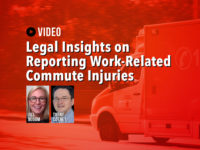OSHA: Contractors Must Record Certain Work-Related Commute Injuries

Photo by paperelements via Pixabay.
Roofing contractors should record injuries from certain motor vehicle accidents to the Occupational Safety and Health Administration (OSHA) as work-related, according to a letter of interpretation from the agency.
The letter, dated Jan. 4, responds to an employer’s question about a scenario involving an employee being injured in a motor vehicle accident. The scenario, broken down, is as follows:
- Employee commutes from home to work in their personal vehicle
- The employee commutes from the workplace to home after ending their shift
- That same day, an emergency at the workplace happens, and the employee’s supervisor calls them to say they need to return to the workplace to help
- The employee starts driving back, but in doing so is involved in and accident and is injured and hospitalized
Typically, if an employee is injured driving to and from work during their normal commute, this does not need to be recorded in the OSHA 300 log. This normal commute represents a non-work-related activity that is within the personal control of the employee, according to OSHA.
In the scenario above, however, OSHA’s letter states the employer must record the injury and hospitalization in their OHSA 300 log, saying the employee was directed back to the workplace by the employer for a work-related issue.
“Since the employee was required to return to the workplace outside of his normal commute, the employee was engaged in a work activity ‘in the interest of the employer,’ and was traveling as a ‘condition of employment,’” the letter states.
The letter notes that an employee’s normal commute ends when they arrive from home to the workplace or start traveling “in the interest of the employer.”
The resulting interpretation is similar to a letter dated March 17, 2021, where OSHA said injuries sustained by an employee while traveling from their home to a customer’s worksite is not work-related.
OSHA’s website states a letter of interpretation cannot create additional employer obligations.
Looking for a reprint of this article?
From high-res PDFs to custom plaques, order your copy today!






